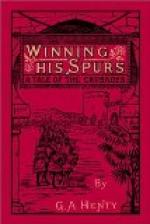Cuthbert’s object, when with his little party he separated from King Richard, was to make his way to Verona, thence cross by Trent into Bavaria, and so to journey to Saxony. Fortunately he had, at the storming of Acre, become possessed of a valuable jewel, and this he now sold, and purchased a charger for himself. He had little fear of any trouble in passing through the north of Italy, for this was neutral ground, where knights of all nations met, and where, neither as an English nor a French crusader would he attract either comment or attention.
It was a slow journey across the northern plains, as of course he had to accommodate his pace to that of his men. Cnut and the archers had grumbled much at the change in the colour of the cross upon their jerkins; and, as Cnut said, would have been willing to run greater perils under their true colours than to affect to belong to any other nationality. On their way they passed through Padua, and there stopped a few days. Cuthbert could but feel, in looking at the splendour of this Italian city, the courteous manner of its people, and the university which was even then famous, how far in advance were those stately cities of Italy to Western Europe. His followers were as much surprised as himself at the splendour of the city. Here they experienced no trouble or annoyance whatever, for to the cities of Italy knights of all nations resorted, learned men came to study, philosophers to dispute, and as these brought their attendants with them, you might in the streets of Padua and its sister cities hear every language in Europe spoken.
From Padua they journeyed to Verona, marvelling greatly at the richness of the country. The footmen, however, grumbled at the flatness of the plain, and said that it was as bad as marching in the Holy Land. On their right, however, the slopes of the Alps, thickly clad with forests, reached down nearly to the road, and Cuthbert assured them that they would have plenty of climbing before they had done. At Verona they tarried again, and wondered much at the great amphitheatre, then almost perfect. Cuthbert related to Cnut and the archers, how men had there been set to fight, while the great stone benches round were thronged with men and women looking on at their death struggles, and said that not unfrequently British captives were brought hither and made to contend in the arena. The honest fellows were full of indignation and horror at the thought of men killing themselves to give sport to others. They were used to hard knocks, and thought but little of their life, and would have betaken themselves to their bows and bills without hesitation in case of a quarrel. But to fight in cold blood for amusement seemed to them very terrible.
Cuthbert would then have travelled on to Milan at that time next to Rome the richest city in Europe, but he longed to be back in England, and was the more anxious as he knew that King Richard would be passing through great dangers, and he hoped to meet him at the Court of Saxony. His money, too, was fast running out, and he found that it would be beyond his slender means to extend his journey so far. At Verona, then, they turned their back on the broad plains of Lombardy, and entered the valley of the Trent.




